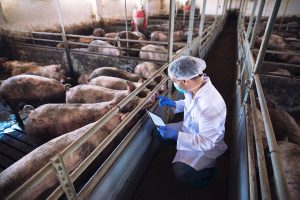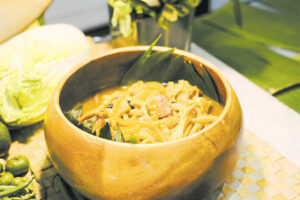Farmers cite ASF threat with easing of import rules on fish feed materials

FARMERS’ associations said they will oppose an easing of import restrictions on fish feed raw materials from countries affected by African Swine Fever (ASF).
“(This) will further expose the still-vulnerable livestock industry to the spread of ASF,” Samahang Industriya ng Agrikultura (SINAG) Chairman Rosendo O. So said in a statement.
“Clearly, this was not approved or allowed by the industry because of the possible damage to the livestock industry,” he added.
Last week, the Department of Agriculture (DA) authorized imports of processed animal protein (PAP) used in fish feed from countries affected by ASF.
The DA had earlier banned imports of processed porcine or pork meal for animal feed use from countries affected by ASF in March.
In 2019, the Philippines recorded its first case of ASF, which eventually decimated its pig herd.
Mr. So said that SINAG, along with other agri-industry groups, will file an appeal against the memorandum.
“(ASF) continues to wreak havoc in some regions, (reducing) the hog population by a little over 3 million… As a result of the ASF disease outbreaks, thousands of farmers suffered complete loss of income and livelihood, with smallholder farmers suffering the most,” it said.
“The DA has said that there is evidence that contaminated feed can possibly transmit the ASF virus to pigs consuming the feed. The private sector, veterinarians, veterinary drug companies and even the government have been creating programs to improve swine biosecurity practices and to encourage the swine farmers to re-populate safely in the absence of a viable vaccine,” it added.
The association said that while the livestock industry recognizes the aquaculture sector’s need to reduce the costs of feed to be more competitive, any threat to biosecurity is the concern of the entire agriculture industry.
“The aquaculture sector’s request to lift the ban of porcine animal protein from countries with ASF cases limited to wild boars will certainly expose the fragile and recovering swine industry to further threats from contaminated raw materials,” it added.
The easing of import rules is expected to “reverse the decline in fish production, enable expansion, and ensure the nutrition of Filipino consumers,” the aquaculture industry said.
“If the import ban on PAPs had continued, the Bureau of Fisheries and Aquatic Resources said 20% of aquaculture production would be imperiled. The aquaculture sector surely welcomes this initiative as it has been requesting for this since April of this year,” Asis G. Perez, co-convenor of food advocacy group Tugon Kabuhayan, said in a briefing on Monday.
“The general public will stand to benefit from this decision as there will be a continuing supply of affordable protein coming from aquaculture,” he added.
Feedmix Specialist II, Inc. Vice-President Norberto O. Chingcuanco, also co-convenor of Tugon Kabuhayan, said that PAP is a key, irreplaceable ingredient for aquaculture feed, and its production process can be expected to kill the ASF virus.
“PAPs are processed at high temperatures that kill all forms of bacteria and viruses,” he said.
“Fish growth slowed down because of the absence of proper ingredients. Nutritionists had a hard time balancing nutritional needs without PAPs. Fish production is not growing. Tugon Kabuhayan has been vigorously advocating to allow imports of PAPs, 70% of which are from Italy, from where they were disallowed starting January,” Mr. Perez added. — Luisa Maria Jacinta C. Jocson




